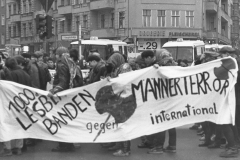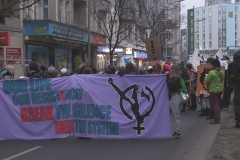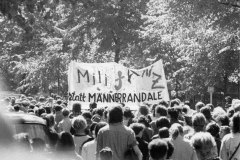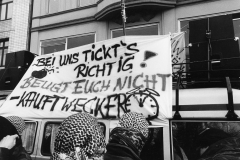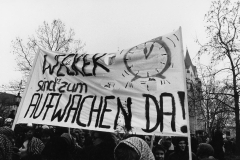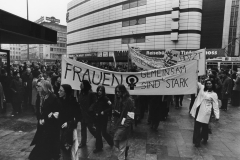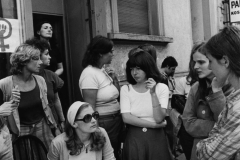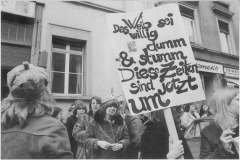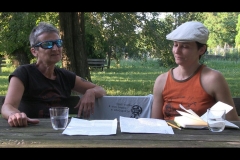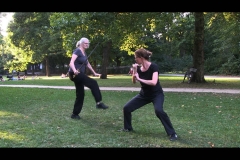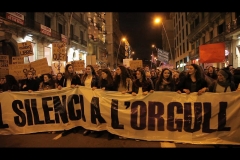Watch the film on Vimeo!
In the 1970s and 1980s, the “Rote Zora” was a militant women’s group in West Germany that organized itself clandestinely. The feminist group emerged from the militant “Revolutionären Zellen” (Revolutionary Cells) and their actions were directed against violence against women, genetic and reproductive technologies, prevailing population policies and international conditions of exploitation as an expression of patriarchal rule. Central to their understanding was the self- empowerment of women-lesbians and breaking with their ascribed passivity and peace-loving nature.
Interviews with a historian and former Zora members as well as narratives from various contemporary witnesses bring the history of the “Rote Zora” and the women-lesbian movement of the time back to life. Historical footage of the women’s and students’ movement in West Germany recalls the struggles of the time. Narratives of women-lesbians from other countries show how they are affected by these policies today.
The film shows that many of the issues that mattered to “Rote Zora” are highly topical and still invoke meaningful discussions.
CAST
Irmes, Nives, Lisa, Uli, Agnes, Cha-Jo, Katharina, Sol, Anna, Fabiana, Catia, Olga
CREW
Directors: Christine Lamberty, Maria Baumeister
Cinematography: Christine Lamberty, Petra Sattler/ Maria Baumeister
Editing: Christine Lamberty, Kathrin Gebhard-Seele
Grading: Jan Krüger
Sound editing: Kuenil Song
Speakers: Imma Harms, Imogen Schuster
Music: Peter Wassen-Lamberty, Merle Weißbach, Steven Kill
Production: lasotras
Maria Baumeister has worked sporadically with the feminist film collective lasotras, including the film “We are Already Here”, a film about the struggles of women in the sans papier movement in Paris in the 90s. She has also focused on anti-colonial struggles.
Christine Lamberty is a co-founder of the feminist collective lasotras which formed as a video group in 1996 to document women’s lives and struggles. The collective still exists today as a loose association, whose composition has changed several times and whose membership is fluid.
The members see themselves less as filmmakers and more as activists and as members of political, social, anti-racist, feminist groups and campaigns and see film as a way to make a contribution to these struggles.
In addition to longer documentary films:
“We are Already Here!” A film about the Sans Papier in Paris.
and “Otras Vias-Other Ways” A film about undocumented migrant women (from South America) in sex work
The group has taken part in and created short films around actions.
In 2001, losotras was co-initiator of the project “Videoletters-a Second Text on War”, in which women from different countries and continents shared their views and experiences of war.
We ourselves come from the radical autonomous feminist movement of the 70s and 80s. In our opinion, it played an essential part in the feminist movement’s significance and success, but it had largely disappeared from the historiography in the 90s. We wanted to pass on the knowledge and experience of this part of the movement and already had the idea in the 90s to do this with a film. This project remained just an idea because we were unable to come up with a satisfactory concept for its cinematic realization due to the complexity of the subject.
Then we were approached with the idea of making a film about the “Rote Zora”. There was hardly any information publicly available in Germany on this little-known part of history. We wanted to contribute to feminist historiography. That then became our focus.
One of the many inspiring experiences during the filming was the encounter with the women from the South Korean community. These activists had come to Germany in the 1960s as well-trained nurses. Their life in Germany was not easy and by no means characterized by respect and recognition; instead, most of them experienced racism and rejection, and were shown little or no appreciation of their professional qualifications. At the beginning of the 1970s, as the economic crisis worsened and there were plans to deport them saying they were no longer needed. The women organized themselves in women’s groups throughout Germany and were able to prevent their deportation through demonstrations and various political actions.
When a strike by female workers intensified and was met with repressive measures at the Adler clothing company in South Korea (at that time, sewing was still done in factories for specific companies), a former nurse who had gone back to Korea sent a letter seeking support for the Adler workers to her former colleagues in Germany. They were still organized as a Korean women’s group across Germany. The women’s keen political awareness ensured that they were quick to lend their support: they translated the letter into German and used it to address the feminist and general public in West Germany. In addition, they organized leaflet campaigns in front of Adler stores to talk to the German workers and thus support the labour struggles in the factories in South Korea. The workers’ demands were: freedom to organize in trade union, an end to sexualized assaults in the workplace, wage increases, reinstatement of dismissed workers, etc.
This experience shows how powerful a movement organized across national borders can be, how migration experiences strengthen us as a whole and how we as white people can learn from these experiences.
https://www.argia.eus/argia-astekaria/2847/christine-lamberty-sistema-eraitsi
https://www.freie-radios.net/94677
FESTIVALS
The 23rd SIWFF 23rd SEOUL INTERNATIONAL WOMEN’S FILM FESTIVAL
https://siwff.or.kr/eng/addon/00000002/history_film_view.asp? m_idx=103434&QueryYear=2021
FIWOM 2021 15th Film Festival for Women’s Rights



